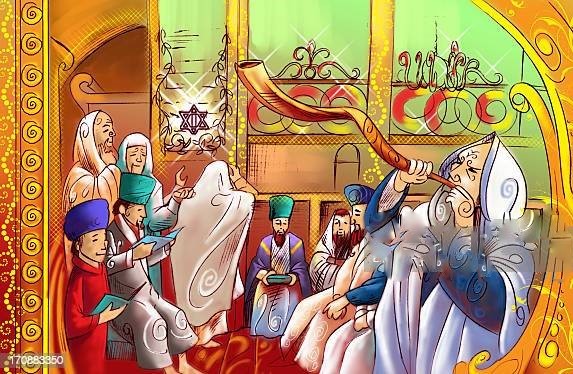SATURDAY PRAYER: YESOD-YESHIVAT HAVERIM יְשִׁיבָה חברים – BABYLONIAN TALMUD p98

“Nor with a collar on his neck.” Said R. Huna: With a collar underneath his jowls. What was the
collar intended for? To prevent irritation of any wounds that may have been on the neck.
“Nor with ankle-boots.” To prevent injury from kicking one foot against the other.
“The hens with cords.” As a distinguishing mark.
“Nor with straps on their feet.” To prevent damage arising from jumping.
“The rams with carts.” To prevent the ends of their tails from damage through trailing on the
ground.
“Nor sheep with sneezing-wood.” (What is it?) Said R. Huna: “In seaports there is to be found a
kind of tree called ‘Hanun, which produces sneezing-wood, which when held under a sheep’s
nose produces sneezing, and while sneezing such vermin as may have lodged in the sheep’s head
are expelled. If such be the case, may rams not go out with it either? For rams sneezing-wood is
not used at all. They butt with their heads, therefore vermin drops out of its own accord.
“Nor the cow with the skin of the hedgehog,” etc. To prevent leeches from sticking to the udder.
“Nor with the strap between the horns.” Why not? Either in accordance with Rabh, who forbids
it at any rate, or in accordance with Samuel, who forbids it as an ornament.
“The cow of R. Elazar b. Azarya,” etc. Had he only one cow? Did not Rabh, or R. Jehudah in the
name of Rabh, say that R. Elazar b. Azarya gave yearly as tithes from his herds as many as
twelve thousand calves? We have learned (in a Boraitha): The cow in question was not his, but a
neighboring woman’s. It is only ascribed to him because he did not protest against it.
Rabh, R. Hanina, R. Jonathan, and R. Habiba [in the whole Section of Festivals, where the four
names stand together, R. Jonathan must be read instead of R. Johanan] all said: He who has the
power to protest against wrong in his house and does not do so, is responsible for (the
transgressions of) every one in his house. In the city (where his protest would be recognized), he
is responsible for the transgressions of every one of the inhabitants of the city; and if he is such a
great man that his word would be respected in the whole world, he is punished for
(transgressions of all) mankind. Said R. Papa: “And the Exilarchs are punished for the sins of all
Israel.” As R. Hanina said: It is written: “The Eternal will enter into judgment with the elders of his people and with the princes thereof” [Isaiah, iii. 14]. If the princes sinned, what have the elders to do with it? The
intent is to say: Because the elders did not protest against the princes.